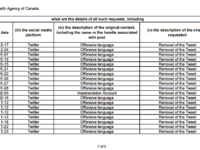The risks associated with the government’s online harms (or online safety) plans is not limited to Canadian Heritage’s credibility gap, which as I’ve recounted has included omitting key information in its public reports on consultations and shocking efforts to exclude contrary voices altogether. A new report, based on the government’s response to a Parliamentary Written Question from Conservative MP Dean Allison (Sessional Paper No. 8555-441-1219) raises new concerns about efforts to censor social media. The written question asked the government for “requests made by the government to social media companies to take down, edit, ban or change in any other way social media content, posts or accounts since January 1, 2020.”
The resulting report is stunning as government departments have in fact pressured the social media companies to remove news links and a range of lawful content including tweets that are said to contain “offensive language” or an “offensive reply.” The use of government power to censor social media posts or news links is exceptionally dangerous and crystallizes the fears of regulatory powers without the necessary due process and oversight that could lead to censorship of lawful content online.











